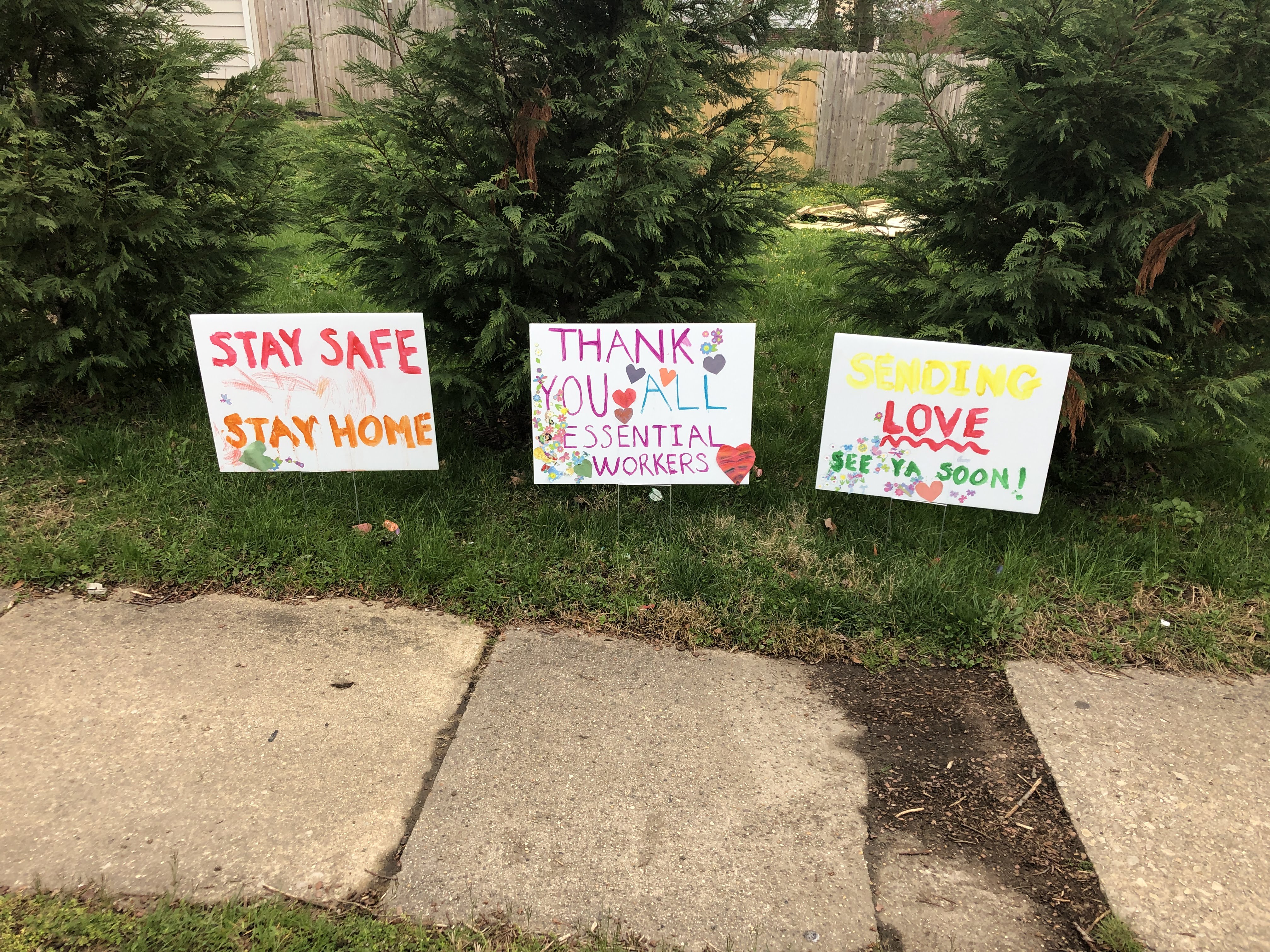
Elephant’s Continually-updating Coronavirus Diary. ~ Waylon
~
I drove by the signs thanking essential workers, and I began to cry.
A wave of grief washed over me, and I sat at the red light and let the tears come.
For the last four weeks, anxiety, unease, worry, and fear had been building up within me. All the while, I juggled working remotely, navigating through the intricacies of flexible learning with two children at home, and helping my 72-year-old mom virtually as best I could.
I’d seen the death toll accounts each day, the stories of more than 16 million Americans being out of work, and read The Washington Post’s article on why the Coronavirus was hitting black communities so hard. Still, it was the signs that caused me to cry.
I cannot find the right words to express what I’m feeling.
I keep waking up thinking I’m in a dystopian novel. I listen as my son talks about missing his junior prom and my daughter as she realizes that she’ll not be going back to school until September at the earliest.
I feel guilty about my white privilege.
I’m angry at the federal government for its lack of a nationwide, coordinated approach.
But I’m also hopeful.
The signs thanking essential workers gave me hope.
I fear that the world I took for granted (school concerts, restaurants, movie theaters, shaking hands, and hugs) is gone or at least not coming back for many months.
To help me deal with my anxiety, I’ve turned to daily meditation, exercise, and writing. But my grief still stays with me and lives within my heart like a disturbing secret.
Like hundreds of millions of Americans, I’m struggling to deal with a crisis of such monumental proportions that I can’t fully see its effects.
I’ve tried throwing myself into my work and my fiction writing, but I feel unfocused and am finding it difficult to concentrate. I have a stack of Post-It notes next to my desk to help me keep track of all the things that I normally don’t need help with remembering, and my Trello board is overloaded as well.
I’ve seen the memes making fun of those of us who are staying at home while the Greatest Generation went off to fight World War II.
I’m not trying to compare my grief with yours or anyone else’s. I want to name my grief. I want to release myself from this grief that I feel, but it’s going to take time.
And that’s what I realized that I had come upon something that would help me.
Say It Out Loud
I am grieving. I grieve. Saying the words, admitting it, and allowing myself to name the feeling has helped put me on the path toward healing.
To the inner critic inside who tells me that I shouldn’t be grieving because I didn’t lose anyone to the virus, I’m bringing that critic close to me and giving it love.
I’m afraid, and the more that I try to deny, repress, or hide my feelings, the worse it has been for me.
As a man, trying to talk about your feelings sometimes comes across like I’m from Mars. Many other men I know would rather do pretty much anything else than talk about how they feel.
Name your grief. Say it and shine a light on it.
I feel the same way I did when my grandfather passed away more than 16 years ago. Unsettled, confused, worried, and sad. I’m jumping through the five stages of grief, and I’m not quite sure where I’m going to land each day. Yesterday I was in denial. I couldn’t believe that all this was happening. I started questioning whether the virus just wasn’t some elaborate conspiracy theory. Then my rational mind took over, and Occam’s razor popped up in my head: “The simplest solution is most likely the right one.”
We’re in the middle of a pandemic. More than 100,000 people have died globally from the virus, and we don’t have a real timeline for when this nightmare will end.
So I say it again, “I’m grieving.”
As much as I want to get over this and “feel better,” I know that grieving will take time. I will oscillate back and forth through the five phases of grief until I will land and settle on acceptance. What I’ve realized is that there is no timeline for that. I’ll be finished grieving when I’m done. And that’s okay.
Acceptance of how I’m feeling and not being afraid to admit it are two instruments in my grief toolkit that I’ve come to cherish.
Self-love for my weakest and dysfunctional personality traits is essential. When I’m angry, fearful, or anxious, I imagine myself as a six-year-old child. I close my eyes, and I walk up to him and put my arms around him. I don’t berate him for wanting to lash out. I don’t make fun of him for wanting to cry. No, I put my arms around him and hold him close. I shut my eyes and give him love.
I take a deep breath, hold it, see myself hugging my younger self, and then slowly exhale.
That’s how I’m going to get through my grief.
What’s your Function?
Earlier this week, I finished listening to Brené Brown’s “Unlocking Us” podcast and heard her share a story about over/under-functioning. She talked about her mother going to the hospital and how she reacted by jumping into a hyper-responsibility mode. Instead of trying to deal with her feelings about her mother’s hospitalization, she turned on the gears and tried to solve all the problems around her.
I finished listening to the podcast and then took some time to reflect. How had I been handling my response to the Coronavirus pandemic?
Let me be vulnerable with you: not well.
For the past month, I’ve been getting up early, writing my next novel, doing a blog post a day for my Let Go and Be Free blog for those who grew up in an alcoholic/dysfunctional home, working full-time, helping my kids, cleaning and doing chores, volunteering to get groceries for a friend and my mom, and keeping up my regular running schedule.
I’m trying to control everything all around me because I feel like I have no control when it comes to the virus. I see layoffs, sickness, fear, and my brain is having a field day wandering down an imaginative lane by coming up with all sorts of horrible futures that are circling around and around in my consciousness.
I’m over-functioning, as Brené Brown shared in her podcast.
My wife and kids are probably ready to cast me off our quarantine island.
But I’ve also noticed that I’ve been under-functioning in other parts of my life. I’ve not volunteered to cook dinner in a while, and I’ve not been as involved in my children’s schoolwork as my wife has. I’m rationalizing things because I’m “doing all this other work.”
Funny how that is, isn’t it?
With my over/under-functioning, I realize now that I’m reacting to how I feel about the pandemic by hiding. Instead of dealing with my emotions, I’m spinning the wheels as a coping mechanism for my grief and anxiety.
I wanted to write an article that I could share with others that didn’t come off too much as “this is what you should do to feel better.” The world really doesn’t need another white male telling it what to do.
So instead, I thought it would be more helpful to be authentic and vulnerable by opening up and sharing all the messy feelings inside.
The experiences that I share are mine, and what has helped me might not help you. But maybe, just maybe, these words can reach out and cross the social distance between us, and we can connect through them. We can feel love for ourselves during this challenge. We are grieving and doing the best we can. And that’s okay.
~
Relephant:
~





Read 0 comments and reply